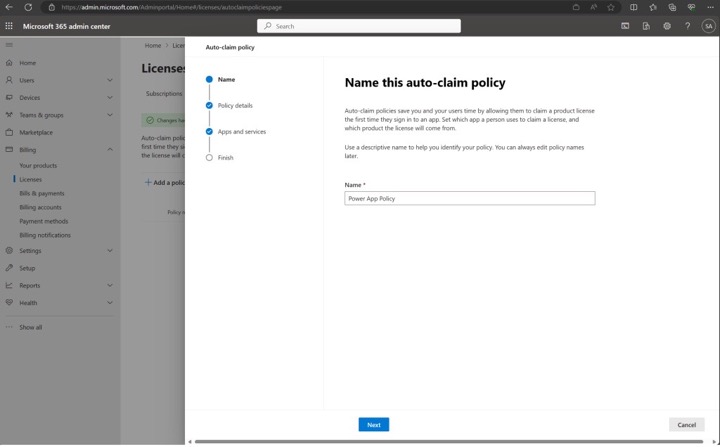- All of Microsoft

Auto-Claim Feature for Power Apps and Licensing Insights for Power Automate Simplifies Management
Unlock auto-claim for Power Apps licenses and gain key insights into Power Automate licensing with Microsoft.
This news discusses the introduction of auto-claim for Power Apps licenses, aiming to simplify license management for administrators. Auto-claim policies allow automatic license assignments to unlicensed users when they engage with Power Apps that require licensing. This means that licenses will be automatically assigned to users who launch premium apps that require a premium license and users accessing apps within a managed environment without a standalone Power Apps license will automatically be granted a Power Apps per user license.
- The auto-claim for Power Apps feature is designed to reduce administrative overhead and ensure that users have the necessary licenses to fully utilize Power Apps.
- Admins can set up auto-claim policy by providing an appropriate name under the Billing > Licenses page of the Microsoft 365 admin center.
- The policy can be configured for Power App per User Plan, enabling proactive address of licensing needs for individual users within the tenant.
The text also talks about the Power Automate licensing experience, allowing administrators to track and manage licenses and answer critical licensing questions. For instance, it gives details about which licenses are used to execute flows in a specific environment, and which flows do not comply with licensing requirements.
- Admins can use the Billings (preview) > Licenses (preview) page in the Power Platform admin center to monitor the consumption of Power Apps and Power Automate licenses and identify any potential licensing issues.
- It provides crucial insights into the types of licenses used to launch apps, run flows, and details on users who are actively consuming licenses.
- This new feature effectively helps in cost savings and efficient utilization of Power Apps and Power Automate licenses.
In-depth Discussion on Auto-claim for Power Apps and Power Automate Licensing Experience
The auto-claim feature for Power Apps and the Power Automate licensing experience brings a significant change in the administration and management of licenses. Automatic assignment of Power Apps licenses to users, reducing manual tasks and providing an efficient licensing process. Power Automate's licensing experience ensures transparency and visibility into license consumption, aiding efficient resource allocation and compliance.
These advancements align with Microsoft’s goal to simplify license management, provide insights for administrators, and help customers make the most of their product investments. Future updates on these features are expected to introduce expanded capabilities for other Microsoft Power Platform products, further shaping the future of license management in the Microsoft ecosystem.
Read the full article Simplifying license management with auto-claim for Power Apps and licensing insights for Power Automate
Learn about Simplifying license management with auto-claim for Power Apps and licensing insights for Power Automate

The text introduces a simplification to the license management process for Power Apps through a feature called 'auto-claim'. This feature is a significant advancement in Microsoft's commitment to streamline licensing administration, ensuring compliance while optimizing product investments. Auto-claim for Power Apps licenses facilitates the automatic assignment of licenses to users engaging with Power Apps, reducing administrative complexity. Auto-claim policies can be set up within the Microsoft 365 admin center, addressing licensing needs for individual Power Apps users within a tenant. This extends to Power Apps per user licenses, and administrators have the opportunity to establish auto-claim policies for these licenses, much like they do for other Microsoft licenses.
More links on about Simplifying license management with auto-claim for Power Apps and licensing insights for Power Automate
- {How to} License autoclaim for Power Apps Licenses
- Aug 8, 2023 — License autoclaim for Power Apps will simplify license assignments for admin. This feature enables their Power Apps users to automatically ...
- Power Platform Licensing Explained
- Microsoft's licensing guide for Power Apps, Power Automate, and Power Virtual Agents was updated in December 2020. It is 28 pages long and quite complex.
- Power Apps | The Power Platform Talks
- ... Power Apps and Power Automate updated, Microsoft has officially enrolled a licensing simplification. ... Power Automate – Customized license request. But this ...
- Power Apps & Power Automate licensing updates (2023)
- Aug 2, 2023 — As a summary, the main idea behind the August 2023 license changes for Power Apps and Power Automate can be described like this:
- Uday Adhikari on LinkedIn: License autoclaim for Power ...
- Agree with Simon Owen this is has potential for real chaos when businesses have a limited number of licenses, then admins have the tough job of having to ...
- Your Guide to Power Platform Licensing
- Nov 22, 2022 — A comprehensive guide to Power Platform licensing (including Power Apps, Power Automate, PowerBI, and Dataverse and more).
Keywords
Microsoft license automation, Power Apps license auto-claim, Microsoft 365 admin policy setup, Power Apps user license guide, Microsoft automate license management